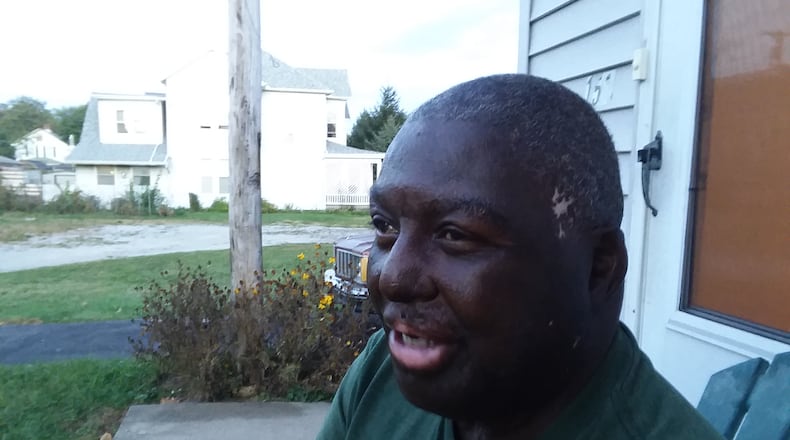“I had (fourth-degree) burns all over, and I could see nothing for 36 days,” said Jewett, a Xenia resident. “I was asleep. The hardest thing for me was having to learn to walk all over again. My muscles went limp from being laid up so long. I lost weight and they had to feed me through my veins because my stomach was so badly burned.
“I couldn’t even drink water; all I got for six months was a trachea feeding tube. Only God could have brought me through.”
MORE FROM THE POVERTY PROJECT
» Poverty can be brought on by unforeseen problems
» How emotional poverty can be as powerful as financial struggles
» Mental illness and its role in the struggle of poverty
On a cool autumn day back in 1996, Jewett was burning brush outside of the private residence of a friend. He was using gasoline in a gas can about six or seven feet away when flames erupted as the fumes ignited.
As his head and upper body became fully engulfed, he frantically tried to beat out the fire, and when he couldn’t, in utter panic and sheer desperation he dove face first into a muddy puddle on the ground. It was there he would leave two of his front teeth.
As it would turn out, that wouldn’t be the worst of it.
Jewett, who had already lost a brother to a murder, now lost much of his life. He lost his home, got divorced and went through more than a year of rehabilitation in the hospital.
When he was finally released, on a cold day in January of 1998, with no money in his pocket, he went to his new home – the local homeless shelter located on South Detroit Street in downtown Xenia.
He found himself firmly entrenched in poverty for the first time in his life as a result of the accident and all that came after it.
He looks back at his shelter experience with sadness, but not for the reason you may think.
“That shelter is no longer there, and I feel so sorry for people who have nowhere to go,” he said.
Years after an accident that has left him scarred for life, Jewett has picked himself up. He’s finally managed to get his own place, but in order to make it, he takes advantage of the free services that help people like him.
He goes to the food bank every week, and he takes advantage of the free meals at One Bistro, a commune-a-cafe at which people can eat in exchange for a small donation or, in the case of those who can’t afford it, for work at the cafe.
“That’s the concept here: someone can work for their food, which allows them to have ownership and dignity and they also become a part of a family,” said Jill Conkel, One Bistro assistant director. “Everyone has their own unique story, we can’t put all homeless people in a box. We see a lot of brokenness, lack of education, desire to change, and lack of opportunity. We see a lot of felons that truly want to work, but no one will give them a chance.”
A service like this is critical for people like Jewett, who survives on a modest disability check. There are no extras, but he’s grateful that he survived his ordeal and for the support he gets in Xenia. He’s now trying to do whatever he can to give back.
With all he has encountered and what little he may have, it is ironic that he not only spends his time giving back, but has somewhat adopted the unofficial role of sponsor to a current homeless man.
“Sometimes he will give me something and ask me to cook it for him, so I do,” Jewett said. “Sometimes I give some of the groceries I get at the pantry. The mayor (Marsha Bayless) helped me, I’m gonna help somebody. Sometimes I even take them in and let them sleep here. I sleep light, but I let them stay.”
One of the most notable differences in his current life is the relentless and painful condition his body now endures, causing his skin on occasion to crack and open from time to time.
“The accident has slowed me down quite a bit and I no longer do many of the things I was doing before. I had gotten away from Christ and got in the fast lane running with a bunch of gang members, but that wasn’t for me,” Jewitt said. “God showed me in different ways that I could have been dead. He brought me to the edge and back. I had been shot and cut before, but being burned it took a lot out of me and I didn’t know how close to dying I was until I came to in that hospital.”
He has learned not to run with the wrong crowd.
“I even had a friend come by with ice (drug), I put him out. I told him to leave because I don’t wanna get caught up in that stuff, that’s how you get caught up,” he said. “I’m 58 years old and I learned to run by yourself, you only have to worry about yourself. Some of my friends who are still here are still out there doing the same thing.”
About the Author
